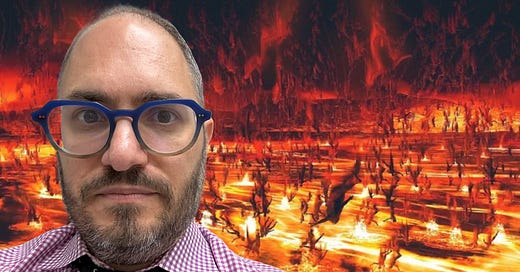Even MDMA-Assisted Trauma Therapy is Traumatic...For the Therapists
Psychedelic Therapy Advocacy Misses the Burden to the Therapist
Welcome to The Frontier Psychiatrists, a daily-enough health-themed newsletter. I also have a book to plug: Inessential Pharmacology. (amazon affiliate link)
In what is doubtless a shameless cash-in on the hype surrounding the FDA’s pending response to Lykos regarding its NDA for MDMA-AT, I offer this think-piece on the role of trauma on trauma therapists and trainees.
One of the underappreciated risks of psychedelic-assisted therapy for individuals with post-traumatic stress disorder is the impact on therapists. The world is patiently waiting for the FDA decision regarding MDMA-assisted therapy. One of the things I haven't seen mentioned in considering that modality is that we need to train specialists. Individuals trained in psychedelic-assisted therapy are not likely a dime dozen. It's going to be expensive to get that training.
Neurosurgeons, similarly, have many years of expensive training after their medical degree. So do Psychiatrists. I could be seeing people for their sore throats and sniffles, but I don't. Neurosurgeons? Even less so. Let's spend a moment thinking about what a trauma therapy specialist will be doing with their day.
Specialist surgeons spend as much time in “The OR” as is reasonable. Is psychedelic-assisted therapy a very—or even possibly the most potent—PTSD treatment that we have? Psychedelic-assisted therapists, both for the economic reality of their lives and for the needs of patients, are going to be expected to do a lot of psychedelic-assisted therapy. This means they're going to be encountering humans who suffered tremendous trauma.
Although military veterans are frequently highlighted in the conversation around PTSD, the majority of PTSD in the population is the result of sexual trauma, particularly for women. In psychedelic-assisted therapy and trauma-specific therapy, generally, you're talking about that trauma. What people are describing to their therapists is awful.
It's some of the most awful sh*t you can imagine. What are the things that caused this trauma? What experiences are people deeply disturbed by and need relief from? This includes some of the most depraved behavior inflicted by humans upon each other. This includes child sexual abuse. This includes intimate partner violence. This includes children beaten or neglected in ways both horrific and myriad. This includes finding family members’ bodies after death by overdose, suicide, or murder. There are so many awful things in the world— it's easier to forget this, except, of course, for people with PTSD—who can't forget it. Even individuals in the military who had an impersonal bomb go off next to them? Many of them suffered trauma well before they joined the military.
PTSD is a “dirty bomb.” To clean it up in therapy, what happened to the traumatized person is traditionally communicated to the therapist.
The communication of human trauma from one person to another is itself traumatizing for the therapists who have to hold space for that person’s trauma. It becomes theirs, too.
There is, of course, scholarship on this topic:




